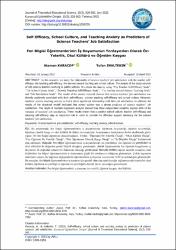Self-Efficacy, school culture, and teaching anxiety as predictors of science teachers’ job satisfaction
Citation
Karaçöp, A. & İnaltekin, T. (2022). Self-Efficacy, School Culture, and Teaching Anxiety as Predictors of Science Teachers’ Job Satisfaction . Journal of Theoretical Educational Science , 15 (3) , 526-560 . DOI: 10.30831/akukeg.1059709Abstract
In this research, we study the relationship of science teachers’ job satisfaction with the teacher self-efficacy, the teaching self-efficacy, the anxiety toward teaching and school culture. The sample of the study consists of 185 science teachers working in public schools. We obtain the data by using “The Teacher Self Efficacy Scale”, “The School Culture Scale”, “Science Teaching Self-Efficacy Scale”, “The Anxiety toward Science Teaching Scale” and “Job Satisfaction Scale”. The results of the current research showed that science teachers’ job satisfaction was directly positively correlated with their self-efficacy, science teaching self-efficacy and school culture. However, teachers’ science teaching anxiety no had a direct significant relationship with their job satisfaction. In addition, the results of the structural model indicated that school culture was a strong predictor of science teachers’ job satisfaction. The result of multiple regression analysis showed that these independent variables explain 40% of the variance of teachers’ job satisfaction. These results shown that a positive school culture, teacher self-efficacy and teaching self-efficacy play an important role in order to provide the affective support necessary for the science teachers’ job satisfaction. Bu araştırmada, fen bilgisi öğretmenlerinin iş doyumlarının, öğretmen öz-yeterliği, öğretim öz-yeterliği,
öğretime yönelik kaygı ve okul kültürü ile ilişkisi incelenmiştir. Araştırmanın örneklemini devlet okullarında görev
yapan 185 fen bilgisi öğretmeni oluşturmaktadır. Veriler, “Öğretmen Öz Yeterlik Ölçeği”, “Okul Kültürü Ölçeği”,
“Fen Öğretimi Öz Yeterlik Ölçeği”, “Fen Öğretimine Yönelik Kaygı Ölçeği” ve “İş Doyumu Ölçeği” kullanılarak
elde edilmiştir. Bulgular, fen bilgisi öğretmenlerinin iş doyumlarının, öz-yeterlikleri, fen öğretimi öz-yeterlikleri ve
okul kültürleri ile doğrudan pozitif ilişkili olduğunu göstermiştir. Ancak öğretmenlerin fen öğretimi kaygılarının iş
doyumları ile doğrudan anlamlı bir ilişkisinin olmadığı görülmüştür. Bununla birlikte yapısal modelin sonuçları, okul
kültürünün fen bilgisi öğretmenlerinin iş doyumunun güçlü bir yordayıcısı olduğunu göstermiştir. Çoklu regresyon
analizinin sonucu, bu bağımsız değişkenlerin öğretmenlerin iş doyumu varyansının %40’ını açıkladığını göstermiştir.
Bu sonuçlar, fen bilgisi öğretmenlerinin iş doyumu için gerekli olan duyuşsal desteğin sağlanmasında olumlu bir okul
kültürü, öğretmen öz-yeterliği ve öğretme öz-yeterliğinin önemli bir rol oynadığını göstermiştir.
Source
Kuramsal Eğitimbilim DergisiVolume
15Issue
3Collections
- Cilt 15 : Sayı 3 [11]



















